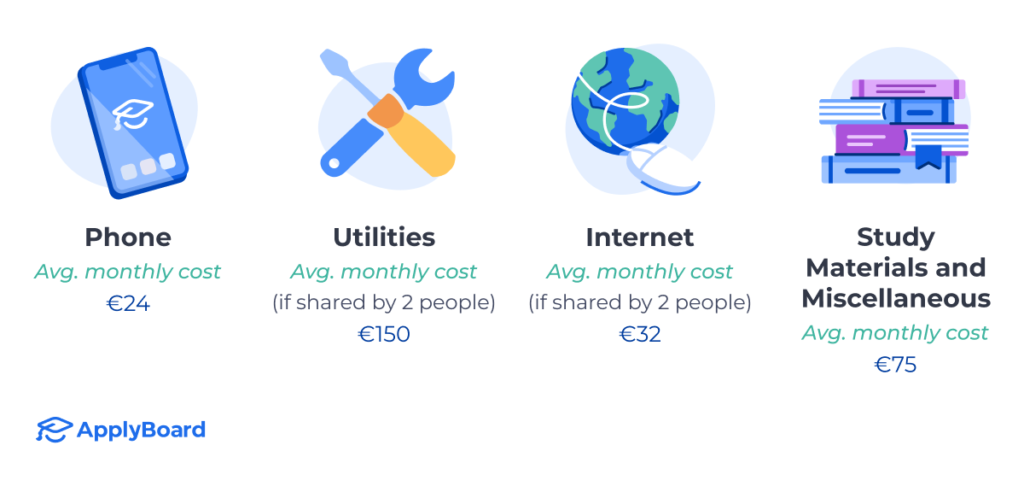As a future international student, one of the most important things you’ll need to plan is your monthly budget. Knowing that you have enough to cover expenses like rent, your phone, groceries, and transportation means you’ll have more brainpower to focus on your studies.
The cost of living in Germany can vary significantly depending on where you choose to study, where you live, and how you choose to get around town. Read on to learn more about the cost of living in Germany and a few tips for keeping your budget balanced.
Note: Costs change regularly, so it’s a good idea to check a cost of living calculator for specific amounts. The numbers below are current as of 2025.
Germany is a cultural and academic powerhouse, and home to 10% of the world’s top universities. From blocked accounts to programme options, ApplyBoard can help you prepare to study in Germany!

Estimated Monthly Cost of Living
While tuition fees at German academic institutions are often quite affordable, and sometimes free, living expenses as a student in Germany can add up quickly. On average, students should budget around €1,120 per month to cover essential expenses like housing, transportation, groceries, health insurance, and study materials:

Of course, your actual cost of living will vary by city, housing style, and how you spend your time outside of class. Students can also save money by sharing housing, cooking meals at home, and using student discounts on public transportation or groceries.
Planning for these expenses is crucial. Knowing what you’ll spend, on average, will shape your day-to-day living. Plus, knowing generally what your cost of living will be is an important part of student visa applications and financial proof requirements.
Here are a few more monthly expenses most students should budget for:

For many international students, working part-time is a helpful way to cover some expenses. Set yourself up to balance work and study successfully with our guide on how to work while studying in Germany.
How the Sperrkonto (Blocked Account) Can Help You Budget for Your Studies
A good place to start when budgeting is the Sperrkonto (or blocked account). A blocked account is a German bank account designed for international students. Before applying for their visa, many international students must deposit a set amount of money in the account to guarantee they can cover their living expenses. This amount is regularly updated to align with the general cost of living across Germany.
International students from outside the European Union (EU) or European Economic Area (EEA) who require a student visa or residence permit must show they have enough money to support themselves during their studies. This is a mandatory part of the student visa application process. Without proof of a Sperrkonto, student visa applications may be rejected.
Here’s a quick look at how the Sperrkonto works:
- Amount Required: As of 2025, eligible international students must deposit at least €11,904 into a Sperrkonto (blocked account) before applying for a student visa.
- Monthly Access: Money from the blocked account (€992) is released every month. Students may then withdraw those funds to cover their living expenses.
However, life in major cities like Munich and Frankfurt is more expensive than in smaller cities like Leipzig or Dresden. For example, monthly rent in Munich is often over €600 for a shared flat. So, if you’re headed for a larger city, prepare for a budget that’s higher than the minimum amount set by the Sperrkonto.

Cost of Living Factors
While everyone’s budget is different, things like where you live and what you eat will affect your budget as an international student.
Housing Options
Generally, international students in Germany live in one of three types of housing:
- Wohnheim (student residences or residence halls): Managed by the academic institution’s Studentenwerk (student services organization), shared residences are often the most affordable housing option. Renting a room usually costs between €250 and €400 per month.
- Wohngemeinschaft (WG, or shared apartments): Sharing a flat with other students typically costs between €300 to €600 per month.
- Private Rentals: Monthly rent ranges from €925 to €1,300 for a central one-bedroom flat in Berlin, Munich, and Frankfurt. While more affordable in smaller communities, it’s generally the most expensive option.
Transportation
Many universities include a semester-long public transportation ticket in their fees. This ticket, generally known as a semester ticket, gives students unlimited use of public transportation within that city or region.
If your institution doesn’t offer a semester ticket, or if you plan to travel across Germany regularly, you might want to buy a Deutschland-Ticket. It’s a monthly pass for nationwide travel on local trains and public transit. If you’re interested, contact your academic institution! Some students can buy a Deutschland-Ticket at a reduced student price.
Health Insurance
Remember, international students need both health and travel insurance. Travel insurance may be free if applied for in conjunction with a visa application. To see what kinds of health coverage you’ll need, you can use an insurance calculator tool.
In Germany, different students are eligible for public and private health insurance:
- Public Health Insurance: Costs between €140 to €150 per month. Available to international students under 30 years old who are studying for a bachelor’s or master’s degree.
- Private Health Insurance: Students who are taking preparatory or language classes, doctoral students, scholarship holders without an employment contract, and any student over 30 must register for a private insurance plan, as they aren’t eligible for public insurance. Private health insurance premiums vary in cost.
Food and Groceries
While grocery bills in Germany are generally lower than in neighbouring European countries, students should still expect to spend between €150 and €250 per month. Shopping at discount supermarkets like Aldi, Lidl, Netto, or Penny can help reduce your grocery bills.
Eating on campus is generally affordable. Meals at Mensas (university canteens) often cost €2.50 to €5. Note that some Mensas are only open for breakfast and lunch, not dinner.

By understanding the costs of living and studying in Germany, you’ll be better equipped to create a realistic budget. This means you’ll have more energy to apply to your studies, and are likely to have a more enjoyable study abroad experience.
Ready to go? Search for a study programme in Germany that suits your goals on the ApplyBoard platform.



